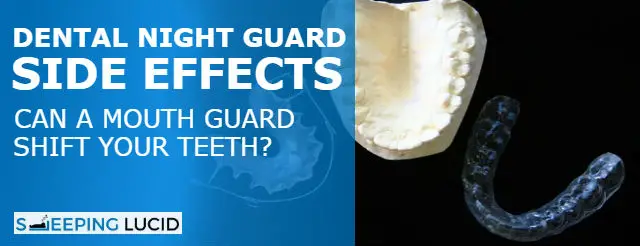What are dental night guard side effects and dangers? Can a night guard shift your teeth? Can you choke on it? Can you swallow a mouthguard in your sleep? Is it normal that your teeth feel weird or even hurt after wearing a night guard? What does sleep apnea have to do with all this?! SO many questions about your dental splint… Worry not. We’ve got ALL the answers!
Dental Night Guard Side Effects
- Tooth movement and bite changes
- Untreated sleep Apnea
- TMJ
- Jaw misalignment
- Choking or swallowing
- Discomfort and pain
- Can hurt gums
- Bad taste in the mouth
Prefer listening to reading? Check out our video version of this article.
The most serious side effects and disadvantages of mouthguards are untreated sleep apnea, tooth movement, and bite changes. Yes, the night guard really can shift your teeth. Dentists used to recommend dental night guards in the past but don’t do it anymore. You might want to give a try to temporomandibular joint disorder pillow instead. Read our article about the best TMJ pillows in 2024.
Dangers of Wearing a Mouth Guard
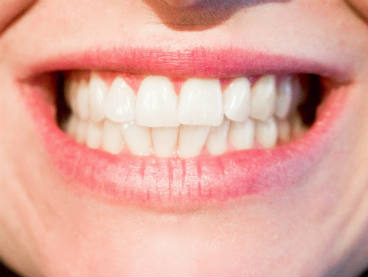
Dental mouth guards are a form of medical treatment, and with any treatment there are those who experience side effects.
1. Tooth movement and bite changes
Can a night guard shift your teeth? Dental night guards are designed to work by offering a layer of protection between your upper and lower teeth.
However, because of the pressure that is placed on the guard, this can also put pressure on your jaw. Prolonged periods of wearing a dental guard could cause your teeth to move slightly which will affect your bite.
2. Untreated Sleep Apnoea
There are dentists who disagree completely with the use of night guards as they argue that using one doesn’t offer a solution, but helps to mask the underlying cause of the grinding – sleep apnea.
Sleep apnea is when someone stops breathing during sleep, however, studies have also shown because of how the jaw is affected it can result in grinding.
3. Choking or swallowing
Not all guards will stay in place and many are fearful that this can result in choking if they are swallowed
4. TMJ (Temporomandibular joint dysfunction) and muscle discomfort
Most dental night guards work by moving your lower jaw forward so that when you sleep you’re less likely to grind your teeth.
However, by doing this, there is a risk that you could experience TMJ (jaw joint) and muscle discomfort.
5. Tooth Discomfort
When using dental night guards, it is possible that you will experience some element of tooth discomfort. This has been a common complaint, but it doesn’t cause any long term damage to your teeth and can be resolved by having the night guard adjusted where possible.
FAQ About Dental Mouth Guards
What are the different types of mouth-guards?
If you’re in the market for a nightguard, then you will soon discover that there different types, three to be exact. Each type of mouthguard comes with its own pros and cons.
1) Dental Lab/Custom-made (by dentist)
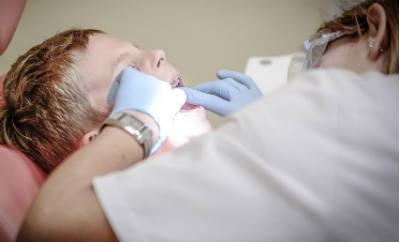
To get a custom-made dental night guard will require a trip to the dentist. All they’ll do is get you to bit down into a tooth mold, which will be sent off to a dental lab where they make your mouth guard.
Pros
- Great fit – the mold ensures that the fit is just right
- All teeth covered – your custom-made dental night guard can be made for your upper and lower teeth
- Long-lasting – these are incredibly durable and are known to last several years
Cons
- Not cheap – getting a custom-made dental night guard will incur costs. Typically you’ll need at least two dental appointments and the molds themselves are cheap either
2) Boil and bite dental night guards
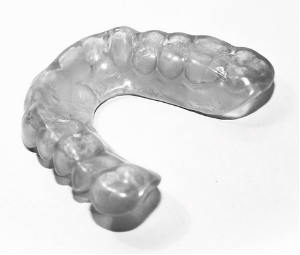
Basically, you boil the night guard material to soften it, pop it in your mouth and then bite down so that it molds to your teeth.
Pros
- It’s molded to your teeth – boil and bite allows you to create your very own custom-made night guard
- Much cheaper than custom-made – the price itself varies, but as you don’t need to go to the dentist to get one your costs will be significantly reduced
Cons
- Lower quality – lower costs equals lower quality. If you grind hard enough in your sleep you could end up biting through the material
- Not quite custom-made – although they are are custom-made, they’re also not custom-made. In other words they are customized to your mouth but not to all of your teeth
3) Disposable Mouth Guards
A disposable dental night guard is by far the most budget friendly option. They can be purchased quickly and are an ideal option for convenience or traveling.
Pros
- Hygienic – because they have a limited life span, you can use them and throw them away which makes these night guards quite hygienic
- Price – disposable mouth guards are the cheapest option on the market, and you get quite a few per box
Cons
- Durability – they only last a week or so
- Staying power – unlike the custom-made and the boil and bite options, disposable guards do have a tendency to fall out in the night
Why do my teeth and/or gums hurt after wearing a night guard?
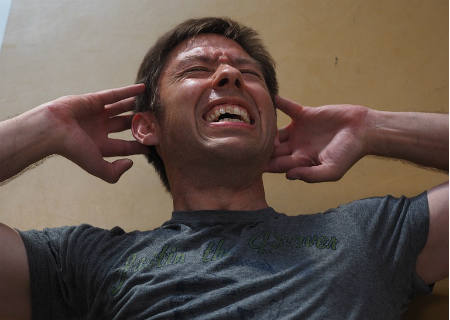
First of all, your teeth and gums should not hurt after wearing a mouthguard.
It’s normal to feel slight discomfort (your teeth may even feel weird!) but if a night guard is causing you pain it’s best to stop wearing it and consult with your dentist.
It might just be that you are not used to wearing it or it’s a wrong fit for you.
How long is a night guard supposed to last?
It depends on they of guard you use. Dentist lab ones can last several years, whilst disposable ones only last a week.
You should however, change your night guard regularly to maintain hygiene standards.
How do I stop clenching my teeth at night?
There are many reasons why people clench their teeth and knowing about them will help you to stop evening clenching. These include;
- Reduce stress – have a relaxing bath before bed or try relaxing exercises
- Wear a mouth guard – they won’t stop the clenching, but they will protect your teeth
- Have misaligned teeth corrected – misaligned teeth can cause clenching
- Avoid caffeine and alcohol – they are stimulants and will prevent you from relaxing when it’s time to go to sleep
- Sleeping Position – do you know what is the best sleeping position to stop grinding your teeth?
Why do people grind their teeth when they sleep?
There are many reasons why people grind their teeth when they sleep, but the most common reasons are:
- Stress and anxiety – if you are feeling stressed or anxious, you will struggle to relax at night which can result in grinding
- Abnormal bite – having an abnormal bite, or misaligned jaw will only make tooth grinding worse
- Crooked teeth – again this can cause your bite and jaw to be slightly out of place
- Suffering from sleep apnea – this considered to be one of the main causes and the two are often closely linked.
If you’re interested to know more or purchase a mouth-guard, read my article about the best dental night guards available on the market.
Conclusion
So there you have it – these are the side effects of dental splints.
Dental night guards offer an effective solution to teeth grinding, however, they don’t treat the cause of the problem and could shift your teeth.
It’s okay if your teeth feel weird after wearing a nightguard but they should NOT hurt.
Many people who grind their teeth have discovered that they do so because they suffer from stress or sleep apnea and many people who have sleep apnea grind their teeth.
If you think you might have sleep apnea it’s a good idea to contact your physician so that they can refer you to a sleep study program.
Let me know if you have any further questions about dental night guard side effects and I’ll be happy to answer them. Take care!

